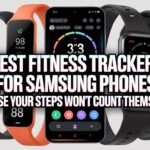Living with diabetes means we pay attention to a lot: what we eat, how much we move, and, honestly, even how we sleep. Fitness trackers can make things a bit easier.
With just a quick glance at our wrists, we can check steps, heart rate, and sometimes even blood sugar levels (with the right add-on). These gadgets help us take control, and let’s be real—they look way cooler than lugging around a notebook and pencil.
But not every fitness tracker is built for diabetes management. We need more than just flashy features or a big step count.
The best trackers for folks like us keep an eye on activity, give us heart rate data, and connect with blood glucose monitors or helpful apps. Syncing should be easy, battery life should last, and the display needs to be readable—especially before coffee.
We also don’t want to charge one more thing every night, so long battery life is a must.
With so many options flooding the market (and our social media feeds), we wanted to cut through the noise. So, we researched, compared, and tested the top picks so you don’t have to.
Best Fitness Trackers for Diabetes Management
Let’s be honest, most of us could use a reminder to move more and check our numbers. That’s why we’re rounding up the best fitness trackers for diabetes management.
Let’s see which gadgets actually make managing our health easier—without making us feel like robots.
Fitbit Inspire 3 Fitness Tracker
If you want a tracker that does more than count steps and actually helps with diabetes and daily health, Fitbit Inspire 3 feels like a trusty sidekick (and it’s way cheaper than hiring a personal trainer).
Pros
- Light on the wrist, heavy on health features.
- Battery lasts so long you might forget where you put the charger.
- Tracks sleep, stress, heart rate, and blood oxygen.
Cons
- GPS needs your phone to tag along.
- Setup feels like solving a puzzle missing a few pieces.
- Some features need a paid membership—boo.
It’s easy to forget you’re even wearing the Fitbit Inspire 3 Fitness Tracker since it’s so light and comfy.
We’ve worn it during workouts, busy days, and even in the shower—no problems. It tracks steps and heart rate effortlessly.
The device keeps us updated on stress and sleep, which matters a lot when we’re juggling diabetes management. Syncing with our phones gave us a headache at first (why do these things never just work?), but once we sorted it out, tracking was smooth.
Blood oxygen tracking and health reminders are nice touches. Notifications pop up but don’t overwhelm, which is perfect if you don’t want tech nagging you all day.
The six months of free premium analytics tempted us, though we can live without the paid version if needed. The lack of built-in GPS means our phones have to come along for walks.
If you want an easy health tracker that helps manage diabetes and doesn’t weigh you down, this is a solid pick.
BSLIZHEN C60 Fitness Tracker
If you want a reliable sidekick for tracking health stats (without emptying your wallet), this tracker deserves a spot on your wrist.
Pros
- Easy to wear and comfortable all day
- Monitors heart rate, blood oxygen, and sleep 24/7
- Bright color screen that’s easy to read, even before coffee
Cons
- App setup made us feel like tech newbies
- Screen isn’t huge—no reading novels here
- Touchscreen needs a gentle tap
The BSLIZHEN C60 surprised us in a good way. It’s lightweight, fits well, and doesn’t scream, “Hey, I’m a fitness tracker!”
The bright AMOLED screen is easy to see, even when we’re groggy in the morning. Our favorite part? It tracks heart rate and blood oxygen all day, every day.
No finger poking required, which is a win. The sleep monitor lets us know if we really are tossing and turning as much as we think.
Custom watch faces keep things fun, so we don’t get bored staring at the same thing. We did wrestle with the app setup—Bluetooth, QR codes, logins—but survived.
Now, messages pop up on our wrists, and reminders nudge us to move (and maybe stop bingeing crime shows). For anyone who wants a tracker that helps with diabetes management and doesn’t require a rocket science degree, the BSLIZHEN C60 Fitness Tracker is a handy choice.
Fitbit Inspire 3
If you want to track your fitness (and maybe pretend you’re a secret agent), the Inspire 3 keeps things simple.
Pros
- Lightweight—no clunky tracker prison for your wrist
- Heart rate and sleep tracking actually help manage diabetes
- Battery lasts long enough to almost lose the charger
Cons
- GPS needs your phone
- Notifications sometimes interrupt more than help
- Touchscreen could use a bigger, “finger-friendly” mode
When we used the Fitbit Inspire 3, it slipped on and disappeared—no bulk, just business. We could see our steps, heart rate, and sleep data in seconds, which is way better than keeping a notebook like it’s 1995.
The stress management features give us a reality check, suggesting we breathe before pouring another cup of coffee. Sleep tracking stands out, showing us not just how much we tossed and turned, but also when our questionable midnight snacks happened.
Paired with the app, logging blood sugar and activity makes management less of a guessing game. Wearing it at the pool or in the shower didn’t cause any problems—it survived a shampoo session.
Our only gripe is the GPS, which needs our phone nearby, so no sneaky solo runs. Still, this tracker keeps us accountable, cheers us on, and only slightly annoys us with its vibrate-happy notifications.
Wontrum Health Fitness Tracker
If you want a feature-packed tracker for diabetes management that won’t break the bank, this one really gets the job done.
Pros
- Tracks blood oxygen, heart rate, and blood pressure all day
- Easy-to-read bright screen with lots of face choices
- Handles over 128 exercise modes and reminders
Cons
- Display is bright—maybe too bright at night
- Takes time to figure out all the app features
- Band feels stiff until it’s broken in
The Wontrum Health Fitness Tracker surprised us with how much it can do for the price. Tracking blood oxygen, heart rate, and blood pressure gives us extra confidence for watching how our body reacts to meals, activity, or meds.
It’s handy having all that info right on our wrist, especially when we’re on the move. Setting up the device took just a few minutes.
We spent longer picking from the 200 watch faces because, honestly, who doesn’t want to see their dog’s face every time they check blood sugar? The huge menu of exercise modes made us realize we could track things we didn’t even know were exercises—if only watching TV counted.
Notifications worked well, so no more frantic phone checks at the gym. Reminders for water, activity, and, for some of us, menstrual cycles, helped us stay on top of routines.
We didn’t have to stress about sweaty workouts or surprise rain since it’s waterproof. The only thing we’d change is the stiff band when new, but after a week, it finally softened up.
Zeacool Fitness Tracker
If you want a diabetes-friendly tracker that covers the basics and looks good doing it, the Zeacool is a worthy pick with a few quirks.
Pros
- Monitors heart rate, blood oxygen, and blood pressure all day (great for folks watching their numbers)
- AMOLED screen keeps everything bright and easy to read, even after just one coffee
- Lightweight and waterproof, so you can wear it everywhere—even when that “quick” shower turns into a concert
Cons
- Step counting gets a little too enthusiastic (sometimes our couches rack up steps)
- Sleep tracking thinks TV marathons are nap time—not so accurate
- Sports modes are fun, but pick the right one or you’ll accidentally become a yogi
This one feels comfortable, even for smaller wrists. The screen is crisp, and swiping through health stats is easier than scrolling social media.
We checked our heart rate and blood pressure anytime, which gave us peace of mind (especially when sneaking a second dessert). The waterproof feature came in handy—washing dishes and splashing in the pool didn’t bother it at all.
Charging is easy, and we got more than a week on one plug-in, so we weren’t chained to the charger. Some tracking isn’t perfect—especially when it thinks lying on the couch is a marathon.
If you can live with a bit of step-counting optimism, this Zeacool tracker offers a good mix of features without costing an arm and a leg. For the price and comfort, it’s a solid addition to the diabetes toolbox.
Zeacool Fitness Tracker
If you want to keep tabs on your health without strapping a mini science lab to your wrist, this tracker is honestly a solid pick.
Pros
- Tracks heart rate, blood pressure, and sleep 24/7
- Battery lasts for days, so you won’t scramble for a charger every night
- Super comfy—even during those endless Netflix sessions
Cons
- Syncing to the app sometimes takes longer than expected
- The screen isn’t great in sunlight
- Setting up sports modes feels like picking a movie when you’re hungry
We’ve been wearing the Zeacool Fitness Tracker, and honestly, none of us expected to keep it on all day and night. The soft strap makes it comfy, so it only comes off for the rare sunburn attempt.
Tracking steps and heart rate is a breeze, and it’s almost too honest about how little we move on lazy days. It checks blood pressure and oxygen levels right on your wrist—no extra gadgets or finger pokes needed.
The battery life impressed us almost as much as our late-night snacking skills. We got nearly two weeks before it asked to be charged. Reminders to drink water pop up just in time for our parched brains.
It’s not perfect. Syncing can test your patience, especially if you’re in a hurry. Choosing between 104 sports modes? Good luck—maybe grab a snack first. And yeah, seeing the screen outdoors means squinting.
But if you want a fun, easy way to manage diabetes and keep up with your health, this tracker is honestly a great choice.
Sanorum Health Fitness Tracker
If you’re after a fitness tracker for diabetes management that’s simple and won’t die mid-zumba, this one’s worth a closer look.
Pros
- Battery keeps going for over a week (so you can lose the charger for a while)
- 24/7 heart rate and blood oxygen tracking, even while you’re asleep
- Water-resistant enough to survive those accidental shower moments
Cons
- Setup isn’t exactly “plug and play”
- No direct blood glucose tracking (maybe one day)
- Can’t reply to texts from your wrist—still gotta use your phone
We love gadgets that don’t quit halfway through the week, and this tracker really sticks around. Whether you’re walking, lounging, or splashing in the pool, you don’t have to worry about it freaking out over water.
The screen is crisp and easy to read, even when the morning sun is being extra. Sleep tracking caught us snoring in embarrassing detail, so at least now we know what “rest” really looks like.
Connecting to your phone takes a little patience, so if you hate reading instructions, you might grumble. But once it’s set up, it tracks steps, calories, and even offers breathing exercises—handy after a fridge raid.
It doesn’t track glucose directly, but it does make diabetes management easier by keeping an eye on the important stuff and nudging you to move.
Amazfit Band 7
If you want a fitness tracker that’s easy to use and feels a little futuristic, the Amazfit Band 7 fits right in.
Pros
- Battery lasts longer than our motivation on leg day
- Big, bright display—easy to check stats in a hurry
- Tracks heart rate and SpO2 all day and night
Cons
- Strap is trickier than it should be
- No direct blood glucose readings (so keep your meter handy)
- Menus can feel a bit crowded sometimes
Honestly, we don’t like charging things constantly, so the Amazfit Band 7’s battery life got us hyped. We went almost three weeks before it needed a recharge, which meant we actually tracked our sleep for once.
The display is roomy and easy to read, whether you’re half-awake or out for a walk. It tracks heart rate, SpO2, stress, and even menstrual cycles (for those who need it). It covers all the basics for watching health trends—super helpful for diabetes management.
We did wrestle with the tiny strap fastener a few times. And nope, it doesn’t read your blood sugar. But built-in Alexa is a fun bonus—set reminders, check the weather, or pretend you’re busy at your desk.
If you want affordable, stylish fitness tracking with enough health insights to help your diabetes journey—but don’t expect miracles—the Amazfit Band 7 is a smart pick. Just don’t let the charger disappear under the couch.
Moremore Fitness Tracker
If you’re juggling diabetes and a million other things, this tracker is like having a nosy little assistant on your wrist (minus the coffee runs).
Pros
- Tracks heart rate, blood pressure, and sleep so you can play doctor
- Battery lasts long enough to forget about the charger
- Light, comfy, and doesn’t look bulky
Cons
- Band color fades faster than we’d like
- Touchscreen can get fussy if your fingers are sweaty
- No GPS for those who like to get lost on purpose
We put this tracker through everything—workouts, desk marathons, and those “oops, I forgot to move” days. Reminders to drink water and get moving are like friendly nudges, not guilt trips.
Text alerts during workouts mean you never miss a message (even if it’s just your friends sending memes). Syncing is simple, and the app doesn’t require a tech degree. The magnetic charger is easy to use, and the battery lasted us almost a week.
The screen is bright and colorful, making stat-checking oddly satisfying. But the band seems to attract dirt, so if you care about style, the fading color might bug you.
No GPS, but for basic heart and activity tracking, it does its job. For low-key diabetes tracking, the Moremore Fitness Tracker keeps things simple—no PhD needed.
ENGERWALL Slim Fitness Tracker
If you want a basic, feather-light tracker that won’t break the bank, the ENGERWALL Slim Fitness Tracker keeps up without needing a nap every four hours.
Pros
- Thin, light, and doesn’t scream “look at my gadget!”
- Monitors heart rate, steps, blood oxygen, and even body temperature
- No cable drama—just plug the band’s end into any USB port
Cons
- The app can be more stubborn than a Monday morning
- Accuracy is “good enough,” not perfect
- Tiny display makes big thumbs feel clumsy
We’re always surprised by how easy it is to forget we’re wearing this thing. The band fits snugly and won’t leave marks, and nobody’s going to mistake it for a calculator watch.
Tracking steps, distance, and calories is simple, so you can focus on moving instead of fiddling with settings. Real-time heart rate and blood oxygen checks come in handy for quick health snapshots.
We liked checking body temperature right on our wrist—it feels a little bit like playing detective. Notifications pop up for messages, so you don’t have to pull out your phone every five minutes at dinner.
Charging is a breeze. Just pop off a strap and stick it into any USB slot—no special cables needed.
The screen packs lots of info in a tiny space, though bigger text would help. For the price, we’re willing to squint a bit and skip the donut guilt.
Buying Guide
Picking a fitness tracker for diabetes can get a bit overwhelming. Nobody wants to end up with just another flashy bracelet that’s really only good for counting steps.
Honestly, we’ve all fallen for the hype at some point. What actually matters is how it helps us manage our health, not just how it looks on our wrist.
Let’s talk about the features that really matter:
- Blood Glucose Tracking Integration: Some trackers actually connect with glucose monitoring apps. That way, we can see more than just our step count in one place.
- Heart Rate Monitoring: Real-time numbers make a difference—guessing just doesn’t cut it anymore.
- Food and Activity Logging: The simpler it is to log meals or workouts, the more likely we’ll stick with it.
Here’s a quick table to compare:
| Feature | Why It Matters |
|---|---|
| Glucose Data Compatibility | Cuts down on switching between apps |
| Heart Rate Tracking | Helps spot highs and lows |
| Sleep Monitoring | Shows if sleep messes with sugar |
| Easy Data Export | Handy for doctor visits |
| Waterproof | Good for sweat, rain, or showers |
We don’t need every fancy feature out there.
But honestly, the ones above can turn a fitness tracker into a useful diabetes tool instead of a boring step counter.
And if a tracker looks like it came from outer space but doesn’t track what we need—well, that’s an easy no.
- Why do my Bluetooth headphones keep resetting? Solving the Mystery of Rebooting Ears - January 5, 2026
- Is WHOOP Worth It for Runners, Cyclists, and Weightlifters or Just Another Expensive Wrist Buddy? - January 5, 2026
- Best Fitness Trackers Under $200 That Won’t Make Your Wallet Sweat - January 4, 2026















